How to Give Jeans a Worn-In Look
You have found the ideal spot if you are seeking for information on how to give your jeans a worn-in appearance. You can give your denim a new appearance by giving it a little bit of work, and the result will be an article of clothing that is both fun and trendy. It doesn't have to be that tough, and there are a lot of different strategies that may assist you in getting the outcome that you want to get.
The blue jeans you wear are a window into both your professional and personal life.
How To Distress Your Jeans:
- To get started, choose the pair of jeans you want to distress and set them aside. Pick a pair that can take the wear and tear of the distressing process by opting for one that is composed of a robust fabric like denim.
- Place your jeans face down on a hard, level surface like a table or the ground. You may mark out the portions of the jeans that you wish to distress by using masking tape or chalk. Knees, thighs, and the seat are all potential candidates for this category.
- Make a clean cut through the denim in the locations that have been designated by using a pair of scissors that are very sharp. Make sure that you cut through the lining as well as the rest of the layers of the cloth.
- After the denim has been cut, use a pair of tweezers or pliers and carefully pluck out little tufts of thread from the locations where it has been cut. This will give the appearance of being torn and agitated.
- Sandpaper may be rubbed into the portions of the jeans that have been cut and frayed to restore their appearance. This will make the cloth more pliable and will damage the denim even more.
- Make extra scuff marks and wear with the help of a wire brush. Make the sections of the jeans that you want to seem worn-in using the wire brush by running it over such places.
- After you have given the jeans the distressing that you want, wash them to make them softer and remove any dirt or loose threads that may have been left behind.
- After the jeans have dried, you may put on them with your preferred top and footwear.
Add Distressed Jean Style To Your Closet
It's possible that when you think about fashion choices, blue jeans aren't the first thing that comes to mind. Nevertheless, these oversized clothes have for a very long time been a tribute to the American ideal. On sometimes, one can even see a wealthy traveler sporting a pair of denim clad pants. This is not unheard of. Because of this tendency, many of the most successful companies in the business have revised their policies regarding the workplace. It should come as no surprise that Levi's and other denim manufacturers like them are industry leaders.
Despite their widespread popularity, blue jeans are not only manufactured in countries such as China, Japan, India, or Italy. They are also available in a wide selection of cuts, colors, and styles to choose from. They are, fortunately, quite easy to mix and match inside a wardrobe. In addition, there are a variety of retail establishments, such as the department store in your neighborhood, where you may buy them. That's in addition to the plethora of shops that may be discovered when you visit your preferred internet site. To put it simply, it's time to go shopping!
There is still a compelling incentive to get up close and personal with a pair of the excellent stuff, despite the fact that the most recent trendsetting jeans are available in plenty. You will need to be aware of where to seek in order to get the finest discounts.
Using a pair of box cutters
Did you know that you can give your jeans a worn-in look by using a box cutter? Because of how simple it is to use and how cleanly it cuts, a box cutter is the instrument of choice for doing this operation. But before you get started, there are a few things you need to be aware of, so let's go over them.
To begin, you will need to decide which method of tearing your jeans would give them the most authentic look. For instance, if you want to produce a ragged edge, you should choose a pair of jeans that is made out of 100 percent cotton. These are the ones that are most prone to fraying and tearing.
The next step is to locate a surface that is completely flat. You may simply use a piece of cardboard instead of the cutting board. If you plan on distressing many pairs of jeans at the same time, you may want to look into getting a box cutter that is designed specifically for use in this manner.
After you have decided how much of an effect you want the distressing to have, you will need to indicate the areas that you want to focus on. The website of InStyle has a practical instructional guide with step-by-step instructions for creating the ideal worn-in appearance.
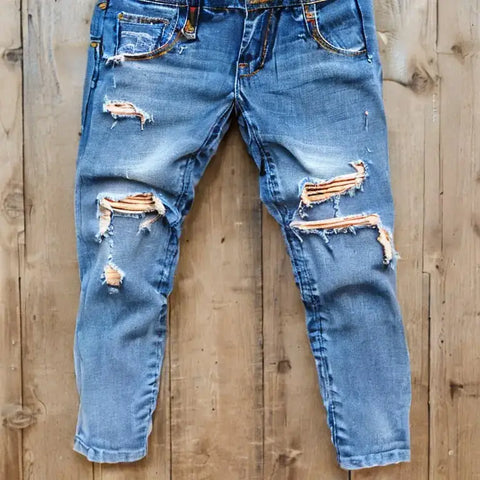
Make a cut in the form of a diamond using a box cutter by beginning at the top and working your way down. This should be done carefully and with a sharp box cutter. It is recommended that you cut the lines at a minimum distance of one inch apart so that you do not waste too much cloth.
The use of a lint roller to remove superfluous fibers from damaged jeans is an excellent approach to ensure that the jeans do not wind up appearing sloppy after the distressing process. You also have the option of using a pumice stone to lightly sand down your jeans in place of the sandpaper.
After all is said and done, you really need to have some damaged jeans that look very nice. They will look great paired with a leather jacket and a white t-shirt with a clean, sharp look. It is important to keep in mind, however, that distressing a quality pair of jeans might cause damage to the top layers of your denim.
Utilizing a stone made of pumice
The distressing of jeans with the use of a pumice stone is an intriguing method. It gives them the appearance of having been worn down and a disturbed sensation. However, you need to exercise caution while using this method. You run the risk of causing some holes as well as harm to the color. Thankfully, this effect may also be achieved via the use of a variety of various methods.
You may give denim a worn-in look by running fabric through a rock tumbler instead of scraping it with a pumice stone. This may provide an appearance that is quite similar, but it will not tear the cloth. The rock tumbler must be big enough to accommodate a pair of pants, and the top must be airtight to prevent water from getting inside.
Sandpaper presents yet another viable alternative. Using sandpaper on the jeans will result in a surface that is somewhat more comfortable. It is possible to get a variety of various outcomes by adjusting the grit of the sandpaper. Sandpaper, for example, might generate a more subtle impact, but more forceful sandpaper can inflict more harm to the surface it is applied to.
Last but not least, you may make the seams of the jeans more rugged by using a pumice stone. Stones made of pumice may also be employed for the process of removing fur from the cloth. Wearing rubber gloves and rubbing the skin with the pumice stone is what you need to do in order to accomplish this task.
If you want a genuine torn look, you can scrape or sand the places where the holes should be. This will give the appearance that the fabric has been torn. You might also use a pumice stone to rub the edges of the hems. After you have done that, you may proceed to massage the areas that have been marked for as long as it takes until they are totally worn out.
People used to be able to stonewash their jeans in the past, but the technique was not always a complete or satisfactory accomplishment. Some people ruined their jeans by rubbing them with abrasive materials too much.
Thanks to the development of enzymes, it is now feasible to produce a wash effect that is comparable to the previous one without inflicting any serious harm. In addition to this, it has a lower volume and water consumption, making the process friendlier to the environment.
Using sandpaper
Sandpaper is by far the most popular tool used during the distressing process of jeans. Denim may be sliced, knipped, scuffed, or even given holes with the use of this tool. This may or may not be the greatest way for distressing your jeans, depending on the choices you make in that regard.
Your first order of business is to determine which parts of the map need to be distressed. If you have jeans that have knee holes, for instance, you may create a "whiskering" look by ripping out the vertical threads to give the appearance of whiskers.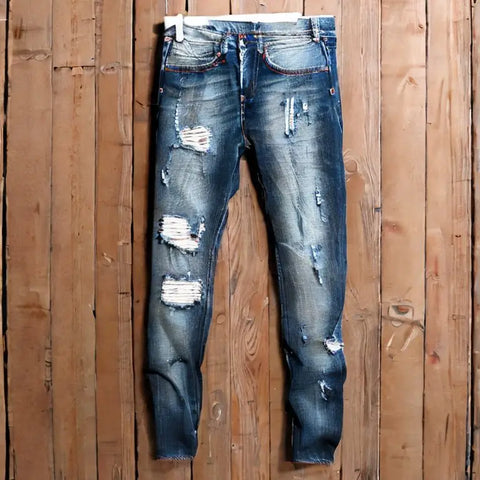
The next step is for you to choose the sandpaper that you will use. You have the option of using a sandpaper with a coarse grain, which might potentially cause the fabric to break, or you could use a sandpaper with a small grit. You may damage the jacket's appearance by using fine sandpaper, which prevents holes from being created.
After settling on the kind of sandpaper to use, the next step is to choose the locations on your denim to undergo the distressing process. You may give your jeans a worn-in look by, for instance, distressing the area around your ankles or scuffing the edges of your belt loops. You will be able to obtain a more genuine worn-in appearance by doing this.
In addition to that, you are going to require a pair of tweezers. These are fantastic for separating the white and blue threads in your jeans, which is a perfect use for them. They are also useful for extracting individual threads from torn areas of fabric.
To create the appearance of your jeans having been worn in more naturally, in addition to using tweezers, you may also use a shaving razor. If you are aiming for a more rough look, this is an extremely crucial consideration to make.
You may also imitate the wear on the wallet by using a deck of cards or a block of wood instead of the items indicated above. In the meanwhile, you may also prepare a strong salt water solution, which, when applied to your jeans, will help them fade and become softer.
The process of creating whiskers on denim
There are several tool categories used in the process of creating whiskers on denim. Sandpaper and pumice stones are two examples of the materials that fall under this category. The remainder are elaborate designs etched on thick boards. Nevertheless, the vast majority of producers choose the rubbing approach. This method is both economical and of a very high standard of excellence.
The rubbing method works well for businesses that manufacture items in a reliable and repeatable manner. To remove certain areas of the cloth, a specialized instrument is required to be employed.
A resin solution is sprayed over the garment as part of the third way of treatment. This approach is quite common in the apparel manufacturing sector. This method does not include the use of formaldehyde in any way.
A third method is referred to as the 3D whisker effect. This may either be manufactured by hand or using a machine. This technique is dependent on the force of impact as well as the durability of the cloth.
Sanding the raw denim is the first step in the process of making whiskers. This causes the surface of the denim to get worn and provides a look of general wear and tear. After that, the denim goes through the washing process. Manufactured whiskers, on the other hand, do not experience fading in the same way as genuine whiskers do.
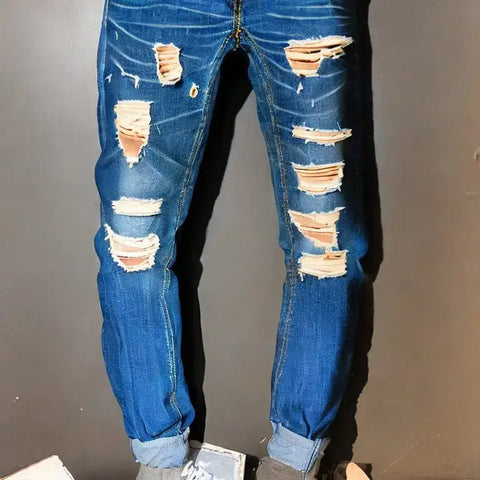
The whiskers that are seen on denim are often crafted during the manufacturing process. They are able to be sewn onto the hems, pockets, and belt loops of the garment, in addition to a specific area of the garment. In most cases, the whiskers on a pair of jeans with a loose fit will be broad, but the whiskers on a pair of jeans with a narrow fit would be straight.
The whiskers on jeans are designed to seem like actual whiskers as closely as possible. Nevertheless, this procedure is not as simple as it may appear like it would be. Due to the fact that they must be sanded by hand, it is unlikely that they will seem to be as lifelike as the whiskers on other forms of apparel.
The whiskering of denim may take on a variety of different looks depending on the design that is chosen. The lines may be narrow or wide depending on the style that the maker chooses to utilize. When working with balloons, it is easiest to create designs using thin lines, whereas large lines provide more of a challenge.




























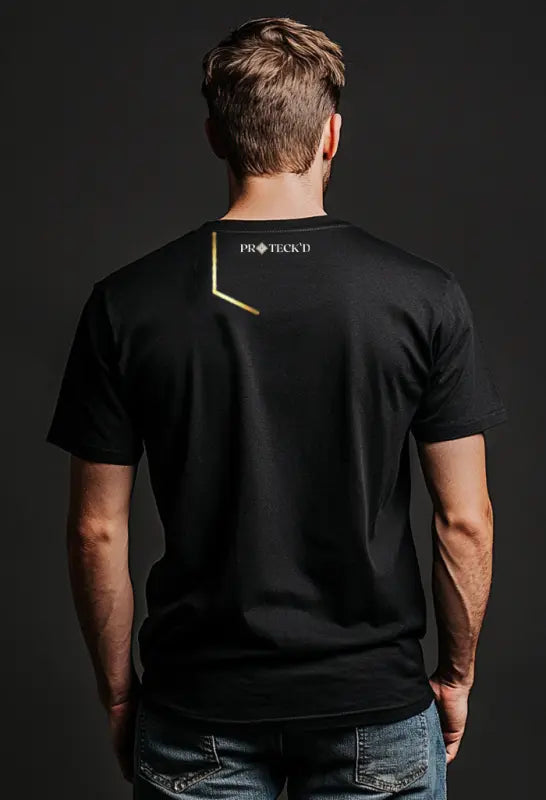



















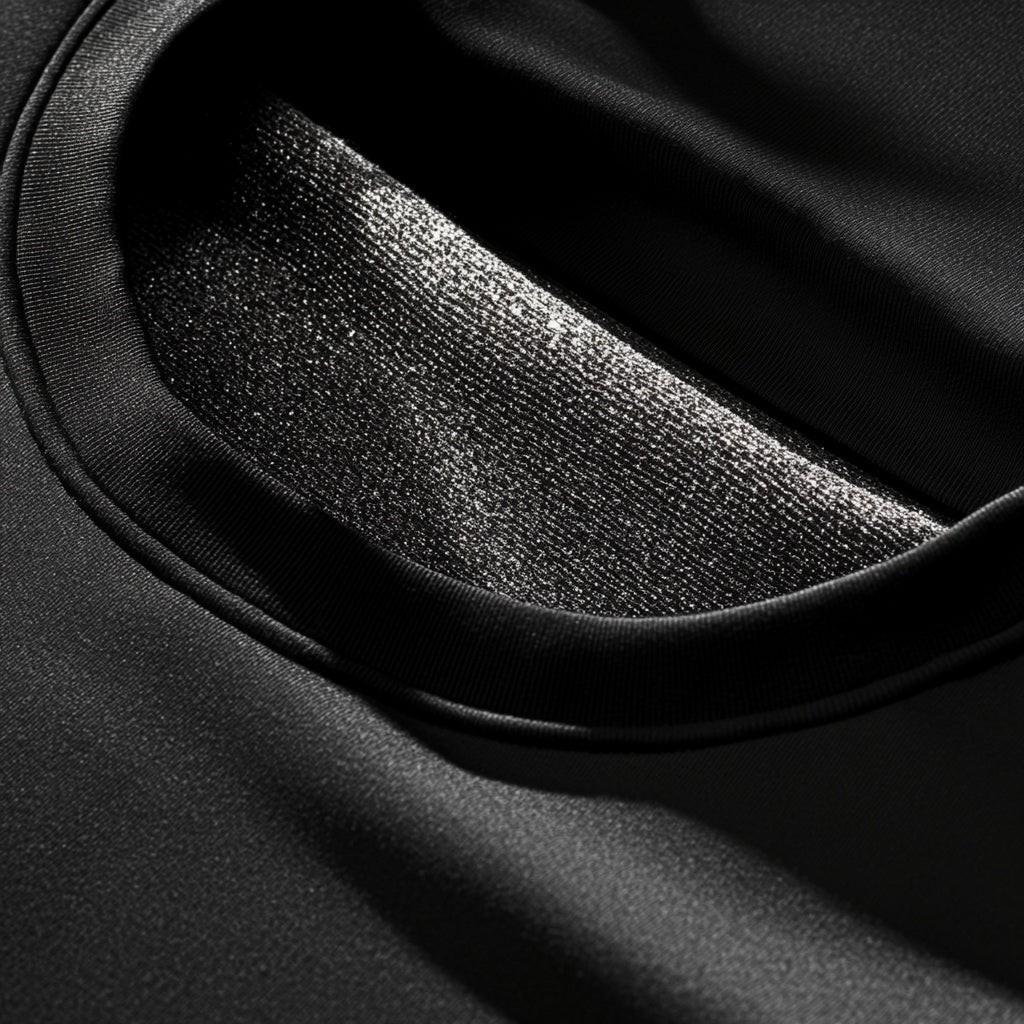







Dejar un comentario